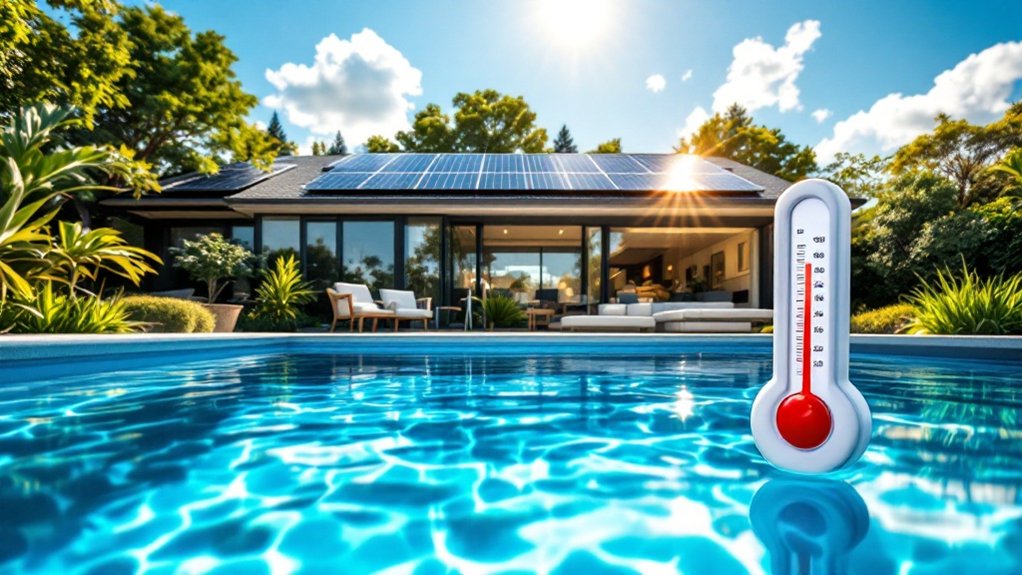The shift towards solar pool heating systems signals a significant change in how homeowners approach pool maintenance. As technology advances, these systems promise enhanced efficiency and ease of use. With rising environmental awareness and the need for cost-effective solutions, solar energy is becoming a viable option. What remains to be explored are the intricate workings of these systems and their long-term impact on both finances and the environment.
Understanding Solar Pool Heating Systems
While many homeowners seek efficient ways to extend their swimming season, solar pool heating systems offer a sustainable solution that combines innovation and environmental responsibility. These systems utilize solar panels installed on rooftops or nearby surfaces to capture sunlight, converting it into usable energy for heating pool water. As sunlight hits the panels, a fluid circulates, absorbing heat and transferring it to the pool via a filtration system. This method not only reduces reliance on fossil fuels but also lowers energy bills, making it an economically attractive option. Moreover, solar pool heating systems can be easily integrated with existing pool setups, providing a seamless upgrade that enhances comfort and enjoyment without compromising environmental values.
The Environmental Benefits of Solar Energy
As the world increasingly prioritizes sustainability, the environmental benefits of solar energy have become a focal point in discussions about renewable resources. Solar energy notably reduces greenhouse gas emissions, helping to mitigate climate change by decreasing reliance on fossil fuels. This clean energy source contributes to improved air quality, as it produces no harmful pollutants during operation. In addition, solar power systems have a minimal ecological footprint compared to traditional energy sources, often requiring less land and water. Moreover, solar energy promotes energy independence, reducing the need for imported fuels and enhancing energy security. By harnessing the sun’s abundant energy, communities can foster a healthier environment while supporting the shift to a sustainable future.
Cost-Effectiveness and Long-Term Savings
Evaluating the cost-effectiveness of solar heating systems for pools begins with an analysis of the initial investment required for installation. While upfront costs may seem significant, the potential for substantial energy bill reductions over time presents a compelling case for long-term savings. This financial perspective highlights the importance of considering both immediate expenses and future benefits when evaluating solar power options.
Initial Investment Analysis
A thorough initial investment analysis of solar pool heating systems reveals significant potential for cost-effectiveness and long-term savings. While the upfront costs of purchasing and installing these systems can be higher compared to traditional heating methods, the investment is often justified by the resulting benefits. Solar systems typically require less maintenance and have a longer lifespan, contributing to substantial savings over time. Additionally, many regions offer incentives or rebates that can offset initial expenses, enhancing financial viability. As energy prices continue to rise, the long-term savings from reduced operational costs make solar pool heaters an appealing option for environmentally conscious homeowners. Consequently, the initial investment can be viewed as a strategic move towards sustainable and economical pool heating solutions.
Energy Bill Reduction
Significant reductions in energy bills can be achieved through the installation of solar pool heating systems. These systems harness sunlight to maintain ideal water temperatures, thereby minimizing reliance on conventional heating methods. As a result, homeowners often experience substantial monthly savings on energy costs, particularly in regions with abundant sunlight.
Over time, the initial investment in solar technology can be recouped through these savings, making the systems not only environmentally friendly but also financially advantageous. Additionally, many regions offer incentives or rebates for solar installations, further enhancing cost-effectiveness. Studies indicate that users can save up to 70% on their pool heating bills, creating a compelling case for solar energy as a long-term solution for pool heating needs.
How Solar Pool Heating Works
When sunlight strikes the solar panels, a process begins that efficiently harnesses renewable energy to heat pool water. The solar panels, typically installed on rooftops or nearby structures, contain a series of tubes filled with water. As sunlight warms the panels, the water inside these tubes absorbs heat. This heated water is then pumped through a filtration system and sent back to the pool, effectively raising its temperature. The cycle continues as long as there is sufficient sunlight. Solar pool heating systems are designed to maintain ideal water temperatures, providing a comfortable swimming experience without relying on conventional energy sources. These systems not only enhance pool usability but also contribute to environmental sustainability by reducing fossil fuel consumption.
Innovations in Solar Technology for Pool Heating
Recent advancements in solar technology have transformed pool heating systems, making them more efficient and user-friendly. Innovations such as improved photovoltaic cells and advanced thermal collectors have increased energy absorption and conversion rates. These developments allow solar heaters to operate effectively even in less sunny conditions, ensuring a consistent temperature for pool users. Furthermore, the integration of smart technology has enabled homeowners to monitor and control their heating systems remotely, optimizing energy usage. Enhanced insulation materials are also contributing to reduced heat loss, further boosting efficiency. Additionally, modular designs are making installation simpler and more adaptable to various pool sizes and shapes, catering to a broader range of consumers. Overall, these innovations are setting the stage for a more sustainable approach to pool heating.
Maintenance and Longevity of Solar Pool Heaters
Proper maintenance is essential for maximizing the longevity of solar pool heaters. Regular inspections help identify potential issues, such as leaks or damaged panels, before they escalate. Cleaning the collector panels periodically guarantees peak sunlight absorption, while removing debris from the system prevents blockages. Additionally, checking and maintaining plumbing connections contributes to system efficiency and longevity. It is advisable to inspect the system before and after the swimming season to verify it is in good working order. Proper winterization methods, such as draining the system, protect against freezing temperatures. By following these maintenance practices, solar pool heater owners can extend the lifespan of their systems while enhancing performance, ultimately leading to a more enjoyable swimming experience.
Real-Life Success Stories From Solar Pool Owners
As solar pool owners discover the benefits of renewable energy, many share inspiring success stories that highlight the advantages of solar pool heating systems. For instance, a family in California reported extending their swimming season by several months, enjoying warm water without the high utility bills they faced with traditional heating methods. Similarly, a couple in Florida noted that their solar system not only maintained comfortable temperatures but also greatly reduced their carbon footprint, aligning with their eco-friendly values. Another homeowner in Arizona emphasized the low maintenance costs associated with solar heating, which allowed them to invest in additional solar panels for their home. These stories exemplify how solar pool heating transforms outdoor experiences while promoting sustainability and cost savings.
Frequently Asked Questions
Can Solar Pool Heaters Work in Colder Climates?
Solar pool heaters can function in colder climates, although efficiency may decrease. Proper installation, insulation, and system design are essential to maximize performance, ensuring that pools remain warm even in less favorable weather conditions.
How Long Does Installation Typically Take?
Installation of solar pool heaters typically takes between one to three days, depending on factors such as system size, roof type, and site accessibility. Professional installation guarantees peak performance and adherence to safety regulations.
Are There Any Rebates for Solar Pool Heating Systems?
Many regions offer rebates for solar pool heating systems, incentivizing adoption. These financial incentives vary by location and can considerably reduce installation costs, making solar heating a more accessible and attractive option for pool owners.
What Are the Common Misconceptions About Solar Pool Heating?
Common misconceptions about solar pool heating include the belief that it is ineffective in cooler climates, requires extensive maintenance, or is prohibitively expensive. In reality, solar heating can be efficient and cost-effective, even in varying conditions.
How Do I Choose the Right Size Solar Heater for My Pool?
Choosing the right size solar heater for a pool involves calculating the pool’s surface area, considering local climate conditions, and evaluating the heater’s efficiency. Properly sizing guarantees ideal heating while maximizing energy savings and performance.
Conclusion
To sum up, the future of pool heating is clearly leaning towards solar power, offering both environmental and economic advantages. As innovations in solar technology continue to enhance efficiency and ease of use, homeowners are increasingly turning to these sustainable solutions. With the promise of long-term savings and reduced reliance on fossil fuels, solar pool heating systems not only provide a practical way to enjoy swimming year-round but also contribute positively to the planet’s health.




